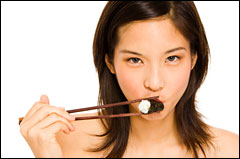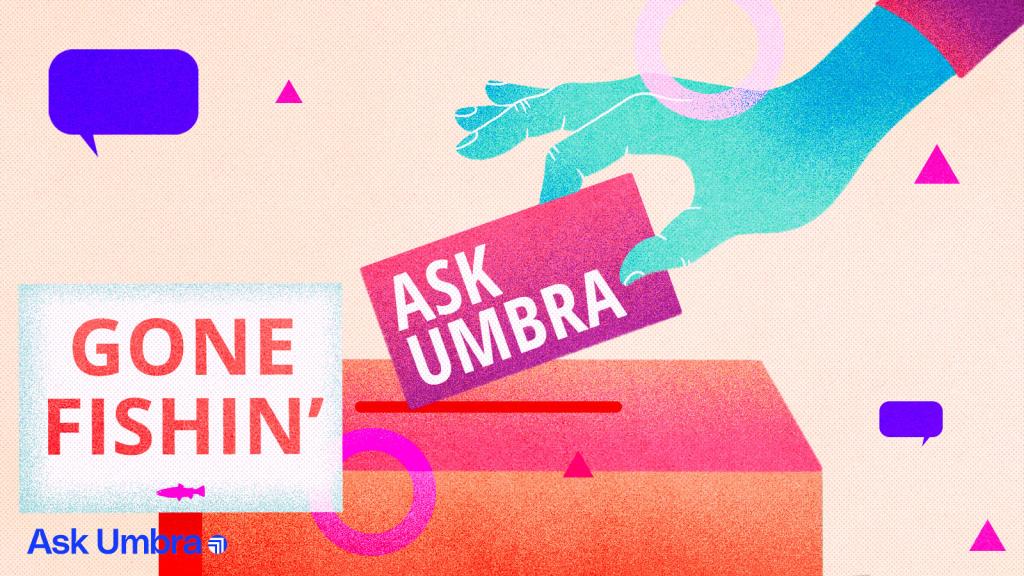Dear Umbra,
While I usually love your column, I have to take issue with encouraging people to eat sushi. This is the second “green” site I have seen that proposes the solution to overfishing is to eat different fish.
Saying “of course you can continue to eat at sushi restaurants without feeling guilty” amounts to pandering to people who are concerned about environmental problems but are not willing to make meaningful change to improve them. If you are truly concerned about the health of the world’s oceans, you should be encouraging people to stop eating sushi and any fish. I do not believe these “conscientious meat-eaters” truly exist. No matter how you change the system (grass-fed, organic, free-range), animal agriculture is innately harmful to the ecosystem.
According to Umbra, you can have your fish and eat it too. I say if you want to save the fish, stop eating them.
Benjamin Martin
Wallingford, Conn.
Dearest Benjamin,
I take umbrage with your excellent letter. (Ha. I’ve written this dang column for what seems like 32 years and not once have I used that terrible pun. Oh, wait, I did use it one other time. What a fab search engine we have.)

Do you have to kiss your sushi good-bye?
Photo: iStockphoto
I didn’t say the solution was to eat different fish. I said the solution is to learn about the fish you are eating, become disgusted by some of it, and revel in the atmosphere at the sushi restaurant. Sushi isn’t all fish — in fact, the Japanese word only refers to the rice, she said defensively.
You do have an excellent point about fish-eating. If one truly cares for all the fishes of the world, one should stop eating all the fishes of the world. In theory. But if that were the sum total of my approach to advice, I would shortly be out of work. Picture the crank-fest that would be this downer of a column: Umbra, what should I do about light bulbs? If you were truly ecological, you would never need new light bulbs because you would never turn on the lights. What about green movers? Sorry, nothing requiring internal combustion engines can truly be “green.” What about bathroom mold? Why is there mold in the bathroom? Are you using water, you wastrel?
Even though I strongly believe, with all the rest of you, that we need to consider the environment in all our choices, I do not believe that no or none is the only answer. I also believe in less, fewer, different, selective, imaginative. Because recruitment is our path to success. No one wants to join a No Fun Club, and no one wants to read Umbra Says No Again on a twice-weekly basis.
My duty is to provide a humorous way to mediate the consumer-fest that is our lives, and periodically remind us all of the main points of environmental action. Only a little wrist-slapping. Some of the wrist-slapping relates to food. Eating less, or no, meat is a main action we can take to reduce our impact on the environment. Land meat uses lots of water, pollutes water, and takes up a lot of space. Air meat is either an endangered no-no or socially unacceptable (squab, anyone?). Sea meat is often non-sustainably harvested (but is generally not agriculture, I must point out).
However, not all fishing is an ocean-bottom-scraping, groundwater-salinating, run-depleting disaster story, just as not all land meat is a travesty of wasted resources. Some fisheries are well-regulated, self-regulated, species-regenerating, and income-generating models of how the world needs to operate as a whole, lest we destroy Earth as we know it.
In fact, fishery success stories are among the most exciting environmental news stories I read. Supporting sustainably run fisheries is similar to buying organic food: With your money, you show food suppliers that eco-labels matter to consumers. Soon enough, producers — in our example, fisherpersons — are able to risk the change to ecological management because they can rely on the resultant market-based rewards.
Humans need to eat, and I cannot delude myself into believing the Revolution will come and make everyone vegetarian. You can, if you want. Be who you are. And eat all the sushi you like — it’s only vinegared rice.
Unagi,
Umbra

